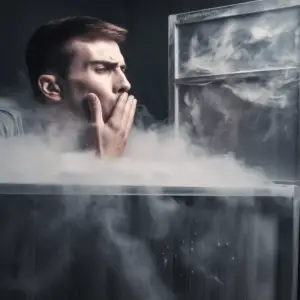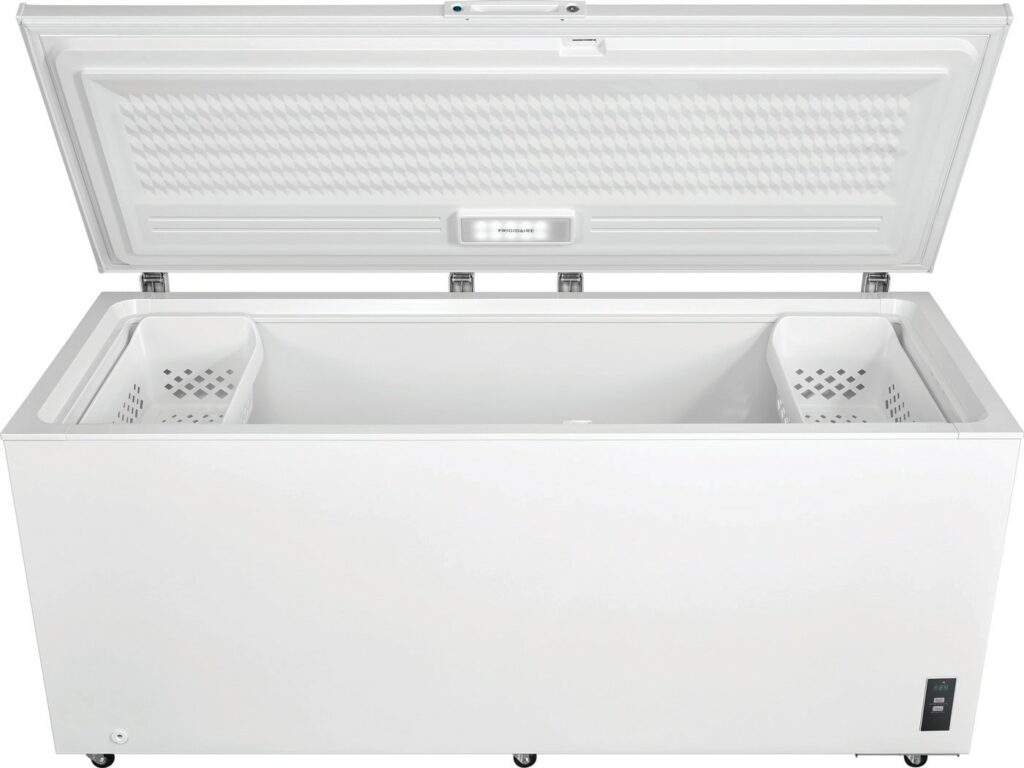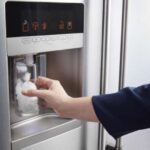Loud Freezer Noises, One of a home appliance’s most crucial parts is the freezer. It ensures that your food remains dehydrated and frozen for a prolonged period.
While it sometimes effectively performs its job, it also emits specific warning indicators when anything is amiss. One of these indicators is a loud, high-pitched noise from your freezer.
This guide will walk you through the five common causes of a freezer making a loud noise and how to solve the problem.
Table of Contents
Freezer Making Loud Noise: Five Common Problems

Evaporator Fan Blade is Frozen
An essential part of a freezer’s cooling system is the evaporator fan. If it is damaged, your frozen food may not be as cold or frozen as it should be; moreover, you might hear an odd noise.
Your freezer’s evaporator maintains the coldness of the contents inside the freezer. It does its job by drawing air from the freezer, blowing it over a coil, and then drawing it back into the freezer.
The coils act as heat exchangers. They transfer the heat from the air to the cold refrigerant inside them. By doing this, your evaporator helps maintain a constant temperature throughout your freezer, swiftly making ice and maintaining food’s coldness for longer.
Check the evaporator for frost buildup if you ever notice a loud buzzing sound coming from your freezer. When this occurs, the rotating fan blade repeatedly strikes the ice, producing an audible sound.
In some instances, the accumulation of frost and ice inside the freezer might cause the fan blade to strike the ice and make a loud noise while it operates.
Damaged Evaporator Fan
The blades in your freezer’s evaporator may start to hit the back wall after regular use. Over time, the impact will cause them to bend or shatter, which will cause the machine to become noisier and less efficient.
If your refrigerator makes a loud noise from outside the unit, the evaporator fan’s damaged blades could be to blame. You’ll typically hear the sound coming from the rear of your refrigerator, where the fan is situated.
The good news is that changing the blades can quickly fix this problem.
Turning off and unplugging a freezer should come first before you begin any repairs. That way, its power source won’t electrocute you if something goes wrong.
The freezer’s back panel must then be removed to access the evaporator fan and motor. The damaged fan must be disconnected and changed with a new one; nothing more needs to be done. Reassemble everything after that.
Defective Evaporator Fan Motor
Maintaining the proper temperature in your refrigerator is crucial to keeping your food safe. How soon that occurs is controlled by the evaporator fan. The motorized evaporator fan blades will propel cold air into the fridge and freezer when the doors are shut to maintain the preset temperatures. It’s one of those technological advancements you seldom ever consider, which is essential for keeping food fresh.
If the freezer seems to be functioning noisily, it may be because the evaporator fan has lost its lubrication. This results in the motor rubbing and grinding against neighboring surfaces, making a loud noise. Replace the evaporator fan motor to resolve this problem.
To replace the motor, start by unplugging the device from the power source. Next, remove the back panel to gain access to the motor. After that, remove the old motor and replace it with the new one before reinstalling the unit’s rear panel.
Dirty Condenser Coils
Typically found at the top of the freezer, condenser coils can accumulate dirt and debris over time. If this happens, a freezer’s inside will take longer to cool, which will cause it to hum while operating.
While your freezer won’t be harmed, cleaning the condenser coils is still crucial to guarantee that the refrigerator’s airflow is at its best.
Look inside your freezer for coils and a condenser fan. Locate it, and then switch off the freezer for around 30 minutes if you discover one.
The dirty condenser coil should then be taken off, cleaned with a vacuum and brush attachment, then thoroughly dried before being replaced. Mild detergent, hot water, and a clean cloth can also be used.
A Defective Compressor

If your refrigerator is a sealed device, it likely has an internal compressor that circulates coolant to maintain the desired temperature. The compressor could be failing if it is operating loudly.
Many compressors contain an internal lubricant to aid in smooth operation. When that lubrication wears out, you might hear the compressor’s buzzing, grating, and grinding sounds.
If you notice an issue with your compressor, the wise thing to do is to call qualified personnel to come and check it for you.
Frequently Asked Question
Is it Okay to Fix the Freezer by Yourself?
Many individuals are unaware that you cannot repair your freezer since the EPA forbids it.
This is due to the high hazard that refrigerant fumes pose to people. If you don’t have the proper safety gear, they’ll harm you permanently, and when they’re discharged into the atmosphere, they harm our ecosystem permanently.
Cooling systems that employ refrigerants can only be serviced by certified experts.
Is it Worthwhile to Have Your Freezer Repaired?
Any refrigerator freezer older than ten years is probably not worth repairing. A new one will use less energy and cost less to operate. However, if the freezer is less than ten years old, getting it fixed will be a wise option.
Why Does a Freezer Stop Freezing?
Due to user error, such as putting too much food in or improperly closing the door, a freezer may not be cold enough. Nevertheless, as elements of your freezer age, their ability to freeze food may be compromised. While some parts can be installed easily as do-it-yourself solutions, others require professional assistance.
How Long Do Freezers Last
The normal lifespan of a freezer is 12 to 20 years. Freezers and gas and electric stoves typically have the longest lifespan compared to other kitchen appliances.fan


